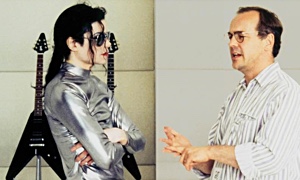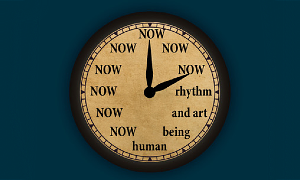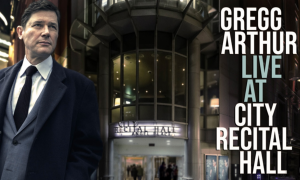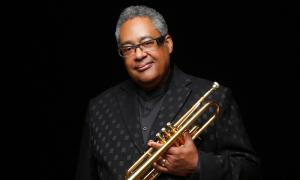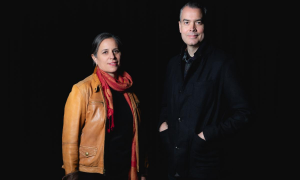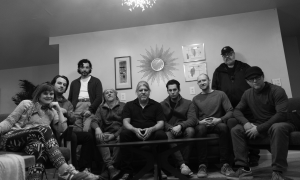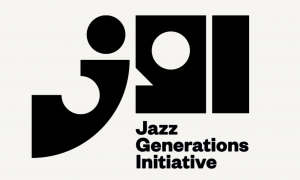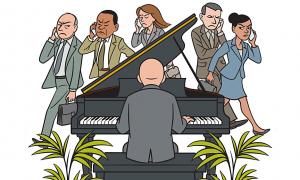Our very own Steve Mayall moderated a session at MidemNet today on cloud music, with a panel discussion featuring some of the key actors in the space.
The panel featured Thomas Hesse from Sony Music Entertainment, Christophe Lange from streaming service simfy, Harry Maloney from platform provider Catch Media and Daren Tsui from music service mSpot. Mayall pointed out that cloud isn't new—the industry was talking about 'the celestial jukebox' ten years ago—so why the excitement now?
“The music lover has become much more important in the whole process," said Maloney. “What we're seeing is a shift in the power base away from the traditional record company models to what we now see is more cloud-based services that give access, and access on-demand, whenever a music lover wants that."
Maloney also said that “the download business will become redundant the way in the past audio cassettes and taping became redundant," thanks to the cloud.
Lange chimed in, saying that “the power of the cloud is that convenience factor"—people don't have to worry about whether they can access a particular song or album. And Hesse agreed. “What makes the cloud possible is technology: having smartphones and connected TVs creates a platform that certainly wasn't there before."
Which is why the celestial jukebox never came to pass when they were first talked about. He also said the new devices move music from a PC-centric world.
“What will make the cloud ultimately successful is the user proposition of digital music suddenly being brain-dead easy. That's the issue that is still holding up the file-based world of digital music: it's very complicated... In the cloud, you do one little thing and as if by magic, it appears everywhere."
Tsui gave his opinion too: “There are smartphones that are connected, tablets and slates, TVs, set-top boxes, consoles... you name it... When you have these connected devices, cloud-based entertainment is the way to go."
Mayall brought up the example of Nokia's Comes With Music, and Sky Songs in the UK—which both closed recently (although CWM stayed in selected emerging markets). Why didn't those services work?
“The market is just moving really, really fast," said Lange. “Many of these services have lacked that speed to catch up with changing and more sophisticated consumer needs for accessing all that music... What Spotify did well, and what we are trying also to do, is getting users hooked to the service. There is still a gap when it comes to the business model... but the most important point is you need to have that user engagement, and then it's a lot easier to monetise from that engagement."
Maloney focused on Comes With Music specifically, relating it to Catch Media's own dealings with retailer Carphone Warehouse in the UK for the Music Anywhere cloud service. The trouble with retailers? “They're not geared up and do not understand there's a process for dealing with a service, and I think that's what happened with Nokia."
“It's actually really hard to do this well," said Hesse. “The bar is pretty high. You've got to get consumers into your ecosystem. And consumers are very smart, and very demanding." The key is persuading people that your service is better than what they have now—which in most cases will be iTunes.
Hesse talked about the car and the living room as being key spaces for the cloud to bring music into. And he also talked about a new paradigm of interoperability across devices, thanks to the cloud. He predicted a handful of services will end up carving the world up between them.
Mayall brought up the EMI/MP3tunes legal battle, focusing on how cloud services sit within the rightsholder licensing models. Tsui said he thinks a backup service like mSpot can tie in with a paid subscription service, where users want to listen to music they don't own too.
However, Maloney jumped in to talk about the “two years of pain" for Catch Media when it was licensing its service, when services like mSpot are not seeking licences. “I think there is proliferation of digital locker services coming through at the moment that haven't been licensed, and are retrospectively going to try to obtain a licence."
Tsui declined the opportunity to get into a legal debate, “we do believe if someone owns music... it's not our job to police how they get their music." But he said this is an opportunity to convert people who didn't pay for music into people who pay for music in other ways, via partnerships with labels."
mSpot is currently negotiating with the labels to figure that out. Hesse chimed in: “It's not a great thing to start a business on very shady legal basis... We will do everything in our power to enforce our rights in those situations... You never make yourselves a lot of friends when you launch something without any licences, then get going and say 'can we negotiate, we've already got so many users...'"
How about Apple? If they launch an iTunes-in-the-cloud service, will that change the whole landscape and make things difficult for other cloud services. Mayall pointed out that Google are also waiting in the wings with their own cloud services.
“Apple do actua.ly have a music cloud service through MobileMe," pointed out Tsui, referring to the ability for Apple users to upload songs to the MobileMe locker than play them.
“Apple and Google are individual businesses, and there is room for other businesses," said Maloney, explaining that retailers and other companies wanting to launch their own services will not want to work with Apple or Google.
Hesse wondered what these services will look like. “We are uncomfortable with a model in which you can just throw everything you own into the cloud and stream it—even to yourself, if not everything you own has been originally purchased. That's going to be a big discussion going forward."
Tsui talked about extra features that cloud services are starting to offer: lyrics, artist biographies, recommendations. However, the final question focused on the difference between on-demand subscription models and cloud lockers.
“You can have both models on a cloud-based version or not on a cloud-based version," explained Hesse. “It can enable to stream to your devices what you already own, in which case it's a locker, or everything in the world, in which case it's a cloud-based subscription service. Those are different variants on the same idea."
And who's the winner? “The winner's the one who provides the best service ultimately," said Hesse, before giving a surprising example. “If you're an iTunes user now, wouldn't it be nice if you could stream or re-download all the music you'd bought on that to all your devices. Wouldn't that be fabulous? And we'd wholeheartedly endorse that."
Over to you, Apple. But the final question for the panel focused on where their services would be going.
Tsui talked about mSpot taking advantage of the fact that it knows what music each user has uploaded. “We think we can take that information to provide very good discovery and recommendations," said Tsui. “The big feature for us in the next few months is a discovery agent."
Meanwhile, Catch Media's Maloney said it's rolling out its Music ANywhere service in more countries, while simfy's Lange said more devices are on the agenda for his service, along with discovery. “We think less is more in a way, so more personalised methods."
And Hesse? “The biggest thing is for services to have such excellent features and a great user interface that users flock to them in much greater numbers."
The panel featured Thomas Hesse from Sony Music Entertainment, Christophe Lange from streaming service simfy, Harry Maloney from platform provider Catch Media and Daren Tsui from music service mSpot. Mayall pointed out that cloud isn't new—the industry was talking about 'the celestial jukebox' ten years ago—so why the excitement now?
“The music lover has become much more important in the whole process," said Maloney. “What we're seeing is a shift in the power base away from the traditional record company models to what we now see is more cloud-based services that give access, and access on-demand, whenever a music lover wants that."
Maloney also said that “the download business will become redundant the way in the past audio cassettes and taping became redundant," thanks to the cloud.
Lange chimed in, saying that “the power of the cloud is that convenience factor"—people don't have to worry about whether they can access a particular song or album. And Hesse agreed. “What makes the cloud possible is technology: having smartphones and connected TVs creates a platform that certainly wasn't there before."
Which is why the celestial jukebox never came to pass when they were first talked about. He also said the new devices move music from a PC-centric world.
“What will make the cloud ultimately successful is the user proposition of digital music suddenly being brain-dead easy. That's the issue that is still holding up the file-based world of digital music: it's very complicated... In the cloud, you do one little thing and as if by magic, it appears everywhere."
Tsui gave his opinion too: “There are smartphones that are connected, tablets and slates, TVs, set-top boxes, consoles... you name it... When you have these connected devices, cloud-based entertainment is the way to go."
Mayall brought up the example of Nokia's Comes With Music, and Sky Songs in the UK—which both closed recently (although CWM stayed in selected emerging markets). Why didn't those services work?
“The market is just moving really, really fast," said Lange. “Many of these services have lacked that speed to catch up with changing and more sophisticated consumer needs for accessing all that music... What Spotify did well, and what we are trying also to do, is getting users hooked to the service. There is still a gap when it comes to the business model... but the most important point is you need to have that user engagement, and then it's a lot easier to monetise from that engagement."
Maloney focused on Comes With Music specifically, relating it to Catch Media's own dealings with retailer Carphone Warehouse in the UK for the Music Anywhere cloud service. The trouble with retailers? “They're not geared up and do not understand there's a process for dealing with a service, and I think that's what happened with Nokia."
“It's actually really hard to do this well," said Hesse. “The bar is pretty high. You've got to get consumers into your ecosystem. And consumers are very smart, and very demanding." The key is persuading people that your service is better than what they have now—which in most cases will be iTunes.
Hesse talked about the car and the living room as being key spaces for the cloud to bring music into. And he also talked about a new paradigm of interoperability across devices, thanks to the cloud. He predicted a handful of services will end up carving the world up between them.
Mayall brought up the EMI/MP3tunes legal battle, focusing on how cloud services sit within the rightsholder licensing models. Tsui said he thinks a backup service like mSpot can tie in with a paid subscription service, where users want to listen to music they don't own too.
However, Maloney jumped in to talk about the “two years of pain" for Catch Media when it was licensing its service, when services like mSpot are not seeking licences. “I think there is proliferation of digital locker services coming through at the moment that haven't been licensed, and are retrospectively going to try to obtain a licence."
Tsui declined the opportunity to get into a legal debate, “we do believe if someone owns music... it's not our job to police how they get their music." But he said this is an opportunity to convert people who didn't pay for music into people who pay for music in other ways, via partnerships with labels."
mSpot is currently negotiating with the labels to figure that out. Hesse chimed in: “It's not a great thing to start a business on very shady legal basis... We will do everything in our power to enforce our rights in those situations... You never make yourselves a lot of friends when you launch something without any licences, then get going and say 'can we negotiate, we've already got so many users...'"
How about Apple? If they launch an iTunes-in-the-cloud service, will that change the whole landscape and make things difficult for other cloud services. Mayall pointed out that Google are also waiting in the wings with their own cloud services.
“Apple do actua.ly have a music cloud service through MobileMe," pointed out Tsui, referring to the ability for Apple users to upload songs to the MobileMe locker than play them.
“Apple and Google are individual businesses, and there is room for other businesses," said Maloney, explaining that retailers and other companies wanting to launch their own services will not want to work with Apple or Google.
Hesse wondered what these services will look like. “We are uncomfortable with a model in which you can just throw everything you own into the cloud and stream it—even to yourself, if not everything you own has been originally purchased. That's going to be a big discussion going forward."
Tsui talked about extra features that cloud services are starting to offer: lyrics, artist biographies, recommendations. However, the final question focused on the difference between on-demand subscription models and cloud lockers.
“You can have both models on a cloud-based version or not on a cloud-based version," explained Hesse. “It can enable to stream to your devices what you already own, in which case it's a locker, or everything in the world, in which case it's a cloud-based subscription service. Those are different variants on the same idea."
And who's the winner? “The winner's the one who provides the best service ultimately," said Hesse, before giving a surprising example. “If you're an iTunes user now, wouldn't it be nice if you could stream or re-download all the music you'd bought on that to all your devices. Wouldn't that be fabulous? And we'd wholeheartedly endorse that."
Over to you, Apple. But the final question for the panel focused on where their services would be going.
Tsui talked about mSpot taking advantage of the fact that it knows what music each user has uploaded. “We think we can take that information to provide very good discovery and recommendations," said Tsui. “The big feature for us in the next few months is a discovery agent."
Meanwhile, Catch Media's Maloney said it's rolling out its Music ANywhere service in more countries, while simfy's Lange said more devices are on the agenda for his service, along with discovery. “We think less is more in a way, so more personalised methods."
And Hesse? “The biggest thing is for services to have such excellent features and a great user interface that users flock to them in much greater numbers."











